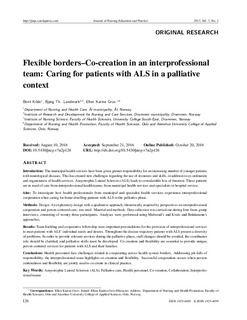| dc.contributor.author | Kilde, Berit | |
| dc.contributor.author | Landmark, Bjørg Th. | |
| dc.contributor.author | Grov, Ellen Karine | |
| dc.date.accessioned | 2017-06-08T12:02:48Z | |
| dc.date.available | 2017-06-08T12:02:48Z | |
| dc.date.created | 2016-10-24T09:43:23Z | |
| dc.date.issued | 2016 | |
| dc.identifier.citation | Journal of Nursing Education and Practice. 2016, 7 (2), 126-134. | nb_NO |
| dc.identifier.issn | 1925-4040 | |
| dc.identifier.uri | http://hdl.handle.net/11250/2445454 | |
| dc.description.abstract | Introduction: The municipal health services have been given greater responsibility for an increasing number of younger patients with neurological diseases. This has created new challenges regarding the use of resources and skills, in addition to co-ordination and organization of health services. Amyotrophic Lateral Sclerosis (ALS) leads to considerable loss of function. These patients are in need of care from interprofessional health teams; from municipal health services and specialists in hospital service. Aim: To investigate how health professionals from municipal and specialist health services experience interprofessional cooperation when caring for home-dwelling patients with ALS in the palliative phase. Methods: Design: An exploratory design with a qualitative approach, theoretically inspired by perspectives on interprofessional cooperation and person-centered care, was used. Material and methods: Data collection was carried out during four focus group interviews, consisting of twenty-three participants. Analyses were performed using Malterud’s and Kvale and Brinkmann’s approaches. Results: Team building and cooperative fellowship were important preconditions for the provision of interprofessional services to meet patients with ALS’ individual needs and desires. Throughout the disease trajectory patients with ALS present a diversity of problems. In order to provide relevant services during the palliative phase, staff changes should be avoided, the coordinator role should be clarified, and palliative skills must be developed. Co-creation and flexibility are essential to provide unique, person-centered services for patients with ALS and their families. Conclusions: Health personnel face challenges related to cooperating across health system borders. Addressing pit-falls of responsibility, the interprofessional team highlights co-creation and flexibility. Successful cooperation occurs when person-centeredness and flexibility are jointly used to co-create in clinical practice. | nb_NO |
| dc.language.iso | eng | nb_NO |
| dc.rights | Navngivelse 4.0 Internasjonal | * |
| dc.rights.uri | http://creativecommons.org/licenses/by/4.0/deed.no | * |
| dc.title | Flexible borders–Co-creation in an interprofessional team: Caring for patients with ALS in a palliative context | nb_NO |
| dc.type | Journal article | nb_NO |
| dc.type | Peer reviewed | nb_NO |
| dc.description.version | publishedVersion | nb_NO |
| dc.source.pagenumber | 126-134 | nb_NO |
| dc.source.volume | 7 | nb_NO |
| dc.source.journal | Journal of Nursing Education and Practice (JNEP) | nb_NO |
| dc.source.issue | 2 | nb_NO |
| dc.identifier.doi | 10.5430/jnep.v7n2p126 | |
| dc.identifier.cristin | 1393855 | |
| cristin.unitcode | 222,90,3,0 | |
| cristin.unitname | Institutt for sykepleievitenskap - Drammen | |
| cristin.ispublished | true | |
| cristin.fulltext | original | |
| cristin.qualitycode | 1 | |

